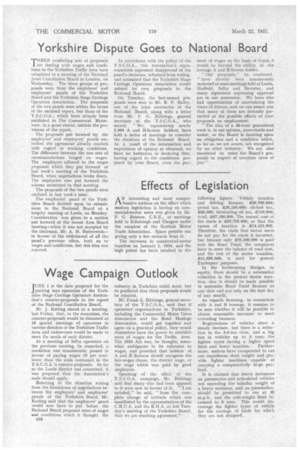Yorkshire Dispute Dispute Goes to National Board
Page 38

If you've noticed an error in this article please click here to report it so we can fix it.
THREE conflicting sets of proposals 1 for dealing with Wages and conditions in the Yorkshire Traffic Area were submitted to a meeting of the National Joint Conciliation Board in London, on Wednesday. The three groups of proposals were from the empleiyers' and employees' panels of the Yorkshire Board and the Yorkshire Stage Carriage Operators Association, The proposals of the two panels were within the terms of the national report, but those of the Y.S.C.O.A., which 114ve already been published in Tim Commercial Motor, were, to a great extent, outside the provisions of the report.
The proposals put forward by the employers and employees' panels embodied the agreement already reached with regard to working conditions. The difference between the two sets of recommendations hinged on wages. The emplOyers adhered to the wages proposals which they put forward at last week's meeting of the Yorkshire Board, when negotiations broke down. The employees also put forward 'the scheme submitted to that meeting.
The proposals of the -two panels were outlined in last week's issue.
The employers' panel of the Yorkshire Board decided upon its submissions to the National Board at a lengthy meeting at Leeds, an Monday. Consideration was given to a motion put forward at the recent Area Board meeting—when it was not accepted by the chairman, Mr. A. H. 13utterwickin favour of the withdrawal of all the panel's previous offers, both as to wages and conditions, but this idea was rejected. • In accordance with the policy of the Y.S.C.O.A., this Association's representatives expressed disapproval of the panel's decisions; refrained from voting, and intimated that the Yorkshire Stage Carriage Operators Association would submit its own proposals to the National Board.
On Tuesday, the last-named proposals were sent to Mr. R. F. Bailey, one of the joint secretaries of the National Board, along with a letter from Mr. F. G. Bihbings, general secretary of the Y.S.C.O.A., who Stated: " We, representing nearly 2,000 A and B-licence holders, have held a series of meetings to consider the decisions of the National Board. As a result of the information and expressions of opinion so obtained, we have no hesitation in declaring that, having regard to the conditions proposed by your Board, even the pay ment of wages on the basis of Grade 3 would be beyond the ability of the average A and B-licence holder.
" Our proposals," he continued, " have already been unanimously endorsed at mass meetings held at Leeds, Sheffield, Selby and Barnsley, and many signatures expressing approval are in our possession. We have also had opportunities of ascertaining the views of drivers, and we can assure you that many of them are seriously perturbed at the possible effects of your proposals on employment.
" The idea of a 48-hour guaranteed week is, in our opinion, unworkable and unfair, as the Board is insisting upon an obligation and a condition which. so far as we are aware, are recognized by no other industry. We are also mandated to resist the Board's proposals in respect of overtime rates of pay."




























































































